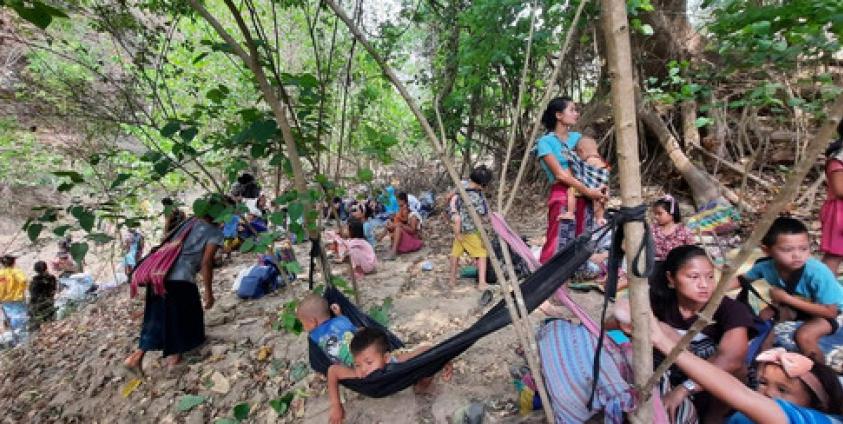The humanitarian crisis in Burma is now at a critical stage. The currency, the kyat, has crashed in the month of September to an all time low.
The military coup that toppled the elected government is now waging a nationwide war on citizens. The military appointed State Administration Council has failed to tackle the covid-19 pandemic.
Hospitals are understaffed as the military issues arrests for doctors, nurses and administrators who joined anit-coup demonstrations.
The State Administration Councils arbitrary rules on banking - opening hours, overseas transfers and withdrawal procedures - are confused, leaving people unable to withdraw savings.
Most international NGO’s have fled Burma, leaving local community groups to do the best they can with limited resources.
A briefing paper published on October 4, 2021 – No where to run: Deepening Humanitarian Crisis in Burma – highlights the ongoing humanitarian crisis in Kachin, Karen, Karenni (Kayah), Chin and Rakhine States. The briefing paper, the work of 10 civil society organizations working in ethnic regions, are now calling for international funders to give them direct access to aid.
Progressive Voice, one of the groups who published the briefing paper, said despite the escalating civil war waging across the country, the Burma military has control of humanitarian aid.
Progressive Voice said not only is the military restricting and destroying aid destined for vulnerable communities, they are also using it as a weapon, especially in the six ethnic states ravaged by armed conflict.
The briefing paper said the situation on the ground has worsened as the military control over humanitarian aid and the tightening of aid provision procedures by international donors puts it out of reach for those most in need.
Naw Htoo Htoo, program director of the Karen Human Rights Group (KHRG), one of briefing papers collaborators said the situation in Burma can be compared to when military ran counter-insurgency campaigns in the 1970s.
“The military operating similar as it did with its scorched earth ‘four cuts’ campaign. The military allowed the Karen National Union to send humanitarian aid, but they used it as means to shoot and arrest people – depriving displaced people of vital supplies.”
The Community Based Organizations pointed out that the current military appointed, State Administrative Council (SAC) spreading propaganda, through its sponsored media mouthpieces and on social media, claiming they are the ‘protectors of the nation’ making it difficult for genuine aid organizations to get direct access to funds.
The CBO’s said international donors need to provide cross-border assistance to community-based ethnic groups to deliver direct humanitarian aid to people in need.
A local community based worker told Karen News the time delay between making a formal application for aid and receiving the aid is taking months from some of the bigger INGO’s.
“They want so much paperwork and verification. Their ‘reality’ of wanting to use banks under military control, make a number of separate payments…we understand accountability and transparency, but our definition what constitutes an ‘emergency’ is vastly different.”
The aid worker cited a recent example where an agreed amount of aid for emergency use was broken into four payments and issued over a period of two months.
“I don’t think they [European based INGO) realised four payments would mean we would have to buy supplies four times, arrange transport four times, arrange security for travel four times – this increased the risk to our safety, as we would have to travel four times through a conflict zone. Doing it this way makes no sense, it increases prices and risks, but is done to satisfy a ‘process’ that looks good on paper, but has nothing to do with an emergency.”
Civil society organizations delivering aid to internally displaced people in ethnic areas added their voices to the difficulties in accessing funding due to strict international donor procedures and called for donors to make the necessary ‘adjustments to their slow moving processes’ to help community groups access funding during emergencies.
Maw Pray Myar from the Karenni National Women’s Organization (KNWO), who worked on the briefing paper said.
“If donors really want to donate to displaced people quickly and effectively, they should work directly through community groups and civil society organisations and bye-pass INGOs. And those who are working for donors, there are restrictions, and they are very tired and do not want to help.”
The recommendations of the CBO alliances are primarily targeting ethnic areas, they said it relevant to Burma’s nationwide humanitarian crisis, including central and southern Burma, as a result of the military coup.
The military-appointed State Administration Council is now waging war on a number of fronts as People’s Defense Forces (PDF) have responded to and taken up arms in protest to the military coup and killing, torture and arrest of civilian protestors by security forces.
Due to the increased armed conflict by the military, the United Nation estimates more than 200,000 civilians have been displaced, creating a great need for emergency humanitarian aid – shelter, food, medicine and security. Civil society groups said as the fighting intensifies across the country, more civilians will flee their homes seeking safety.
Civil society organizations participating in the briefing paper included the; Karen Women’s Organization, Human Rights Foundation of Monland, Karenni Civil Society Network, Karen Human Rights Group, Karen Peace Support Network, Karenni National Women’s Organization, Kachin Women’s Association (Thailand), Ta’ang (Palaung) Women’s Organization; Pa-O Women’s Union and Progressive Voice.








